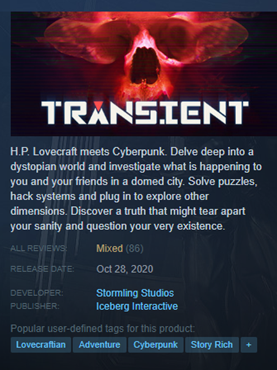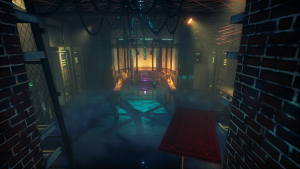I know there are some people out there who are sick of the abundance of Lovecraftian video games. Most of them honestly aren’t very good, so when another one comes out, many simply assume they’re a waste of time.
Not me, though. I’m pumped for news of any significant Lovecraftian game because I can’t get enough of cosmic horror. When I heard about Transient, a cyberpunk cosmic horror game that takes place in the future and stars Randolph Carter, I was ecstatic.
I don’t normally buy games on the day of release or through pre-order. I like to wait until I see what other players say…but I couldn’t resist with Transient.
Player reviews are mixed at this time, but does that mean it’s bad? Keep reading this Transient review to learn what I think.

Intro to Transient

In my somewhat layman-style reviews, I like to start by describing the game in general. With that being said, allow me to introduce you to Transient if you’ve never heard of it.
As I mentioned in the beginning, Transient is a Lovecraftian game with a cyberpunk theme to it, which is what every game seems to be doing these days, thanks to the fame (or infamy) of Cyberpunk 2077. I hesitate to call it horror because it doesn’t focus on scaring you quite as much as other Lovecraftian games do.
You play as Randolph Carter, a traditional recurring Lovecraftian protagonist. In Transient, he resides in a domed city called Providence, which is initially defined as the last “surviving” city after some apocalyptic event.
I say “surviving” with those quotations because it’s debatable whether or not the residents are living. An increasing number of people are taking refuge in cyber enclaves, which are virtual worlds custom tailored to their desires – sort of like in The Matrix.
Outside those cyber enclaves, weird stuff is happening. Randolph Carter, a hacker, starts to discover rumors of strange insectoid creatures appearing all over the city and his hacker cohorts begin dropping like flies.
Transient Review
As always, I’m breaking this review into several bite-sized chunks:
- Story
- Gameplay
- Soundtrack
- Characters
- Visuals
This makes it easier to get more in-depth about each part of the game while breaking up walls of text. Let’s get started…
Story

As a writer, story is usually the most important part of a game to me. I can overlook a lot of issues with a game if the story hooks me in.
Unfortunately, Transient didn’t have that effect on me. I thought the story was okay – it was an interesting enough premise – but it was also strangely confusing. In comparison, Conarium, another game released by the same publisher, was much clearer.
My confusion might come from the fact that I didn’t find every collectible document in the game. Perhaps if I’d read every digital file scattered throughout Providence, the pieces would have come together. The problem with this way of exposition is that it relies on players to find all those pieces, and I wish there was a way to weave the whole core story in the normal course of gameplay better.
The pieces I did gather were okay. Tonally, they didn’t fit in with Lovecraftian lore as well, and I fear the cosmic horror elements were lost beneath the existentialist (and completely human) questions that naturally occur in a cyberpunk setting where people can lead largely virtual lives.
At the end of the day, I was left feeling confused and underwhelmed. I feel the story would have made more sense and meshed cyberpunk and cosmic horror together better if, rather than pitting us against insectoid creatures and a rogue AI, it was a story about the way corporations can become god-like. It would have been more meaningful if we’d been forced to confront a massive corporation so high-tech it seems divine in comparison with a single person.
Gameplay

So how about the gameplay? Does it feel smooth and natural to traverse the city of Providence?
Well, Transient’s gameplay is…light, to say the least. It’s essentially just a walking simulator, which is more like an interactive story than a comprehensive video game.
There’s no combat, no crafting system, no character customization, and no role-playing elements. You, as Randolph, simply walk from point A to point B and onward, reading documentation that serves as exposition along the way and taking in the sights.
There are, however, two points in the game that stick out: when you have to play two different mini games to extract some more information. The first one is a mini-game strongly reminiscent of the first Resident Evil games, in which you must search a house filled with shambling undead. The second game is a futuristic sci-fi game where you fend off robot attacks as you hack computers.
In a game where all you otherwise do is walk around, these mini-games felt extremely out of place. Jarringly so, in fact. I think the developers actually added an option to skip them eventually, which begs the question: why add them in the first place?
Anyway, I don’t mind walking simulators. Like I said, story matters more to me. If you don’t like the basic and oftentimes boring (or soothing) mechanics of a walking simulator, you won’t like Transient.
Soundtrack
Music is an important part of the gaming experience. The wrong soundtrack can ruin your immersion, and the right one can make it transcendent.
I don’t think Transient’s soundtrack was particularly remarkable. It wasn’t bad, but now as I write about it, I struggle to remember any of the music at all.
I guess I’d simply describe it as serviceable. You won’t find yourself adding it to playlists to listen to later, but it also won’t shake you free from your immersion.
Characters

Characters matter, too, and Transient does have a limited cast of them. But “limited” really is the key word here.
Randolph is the almost the only character you’ll experience. Most of his colleagues are dead by the time you “encounter” them. Sure, you’ll run into a couple other characters and talk to entities along the way, but only briefly.
I’d say the characters aren’t amazingly strong in this story and you won’t feel attached to them. This isn’t necessarily a weakness in a story that’s supposed to focus on cosmic horror – a type of horror that centers on things indescribably larger than humanity. It’s usually more about ideas than it is about individual people.
So while the characters are generally weak in Transient, I would argue that doesn’t matter. It would be nice to have strong and fully fleshed-out people to ride along with, but the lack of them doesn’t ruin the game for me.
Visuals

One thing Transient does quite well is give you a whole panoply of gorgeous settings to feast your eyes on. There are so many marble-lined corridors, ancient statues, shelves of moldering books, terrifying bas-reliefs, and dystopian garbage-strewn streets to stare it.
As you can see from most of the pictures I’ve included throughout this review, I found myself drawn to the scenery time and time again. There are plenty of details to admire…

So the setting gets an A from me. I was content to stare at much of it for hours.
The part where the visuals fall flat is whenever you see a person. In particular, Randolph Carter approaches the uncanny valley, looking almost but not quite human. There’s something stiff and yet strangely rubbery about the people in the game, as if they’re just robotic skeletons covered in faux flesh. It was unnerving, and I cringed almost any time I had to see the protagonist.
Is Transient Worth Playing?
Unlike with Alan Wake or Alien: Isolation, it’s much harder for me to answer this question. I took a break while writing this article, walked away, and literally spent an hour mulling it over.
Here’s the conclusion I came to: I think Transient is worth playing if you’re a particular type of person. If you don’t mind walking simulators or you’re a diehard Lovecraftian horror fan, I think it’s worth playing at least once.
However, even if you fall into one or even both of those categories, I wouldn’t recommend buying it at full price (which, at the time of this post, was about $20). I managed to beat the game in about four or five hours, and I don’t think a few scant hours of gameplay justifies the full cost. On sale, though…grab it.
I don’t think I would recommend Transient to the average gamer. Many people would likely find it too boring due to the lack of complex gameplay and the large amount of reading you have to do to make sense of the plot. Plus, Lovecraftian horror is naturally more appealing to people who enjoy bizarre hypotheticals and abstract concepts.
Wrap Up
Lovecraftian horror is tricky to pin down in visual mediums like games and movies. It often features entities and concepts that are indescribable, and how are you supposed to portray such things in games?
There’s a reason Lovecraftian games in general tend to cling to hackneyed images and concepts, such as the alcoholic investigator stereotype used in Call of Cthulhu or the abundance of tentacles. It’s too easy to keep making things like that over and over again.
Transient falls short in many ways, but I still feel as if it’s still a breath of fresh air when compared with your average Lovecraftian horror game. The publisher, Iceberg Interactive, is one of the few publishers I’ve come across that seems to have a grasp on the genre. I don’t regret my time playing it, even if I think there are quite a few improvements that could be made.

